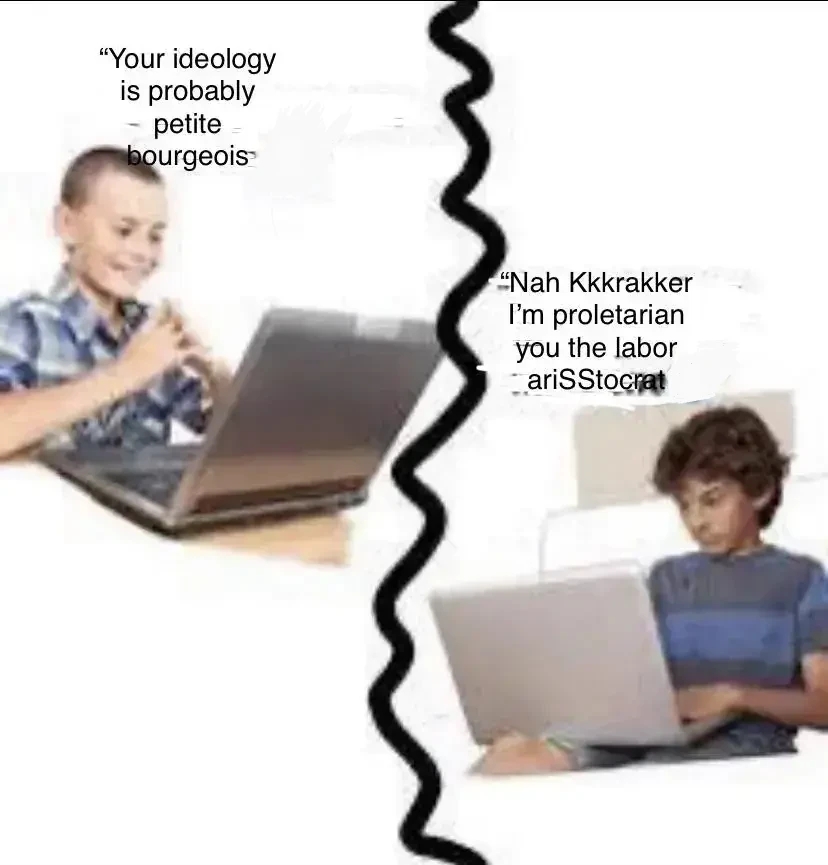this post was submitted on 26 Apr 2024
170 points (100.0% liked)
memes
22781 readers
510 users here now
dank memes
Rules:
-
All posts must be memes and follow a general meme setup.
-
No unedited webcomics.
-
Someone saying something funny or cringe on twitter/tumblr/reddit/etc. is not a meme. Post that stuff in /c/slop
-
Va*sh posting is haram and will be removed.
-
Follow the code of conduct.
-
Tag OC at the end of your title and we'll probably pin it for a while if we see it.
-
Recent reposts might be removed.
-
No anti-natalism memes. See: Eco-fascism Primer
founded 4 years ago
MODERATORS
you are viewing a single comment's thread
view the rest of the comments
view the rest of the comments

Doesn't seem like a great definition. Seems like it should be rooted in one's relationship to labor and capital rather than math. Some guy in Missouri living out of his car making sub-minimum wage as a waiter would qualify by the numbers, but it doesn't make sense to call him a labor aristocrat.
I think the definition is decent but they cited the wrong statistic. The definition refers to being paid more than your fair share of the value created by all labor, not to being paid more than the average or median wage. The value created is higher than the wage though so his cutoff value isn't meaningful.
Basically the definition is saying that labor aristocrats are people who are getting "cut in" on the profits of imperialism, their labor is being valued higher than the proportion of all value created that they contributed. So essentially if all labor was treated equally, capitalists would actually be losing money on labor aristocrats. I don't know where the actual line is but it's definitely higher than that.
There still might be room for criticism of that concept, but it's not just based on income math
This is a better phrasing, but it's still not clear what the use of this is. It illustrates how imperialism benefits the poor in the imperial core, but that doesn't seem novel or controversial, and the use I see most frequently -- writing off basically everyone in the imperial core in terms of socialist potential -- seems way off base.
I don't think the main reason socialism isn't widely popular among the poor of the U.S. is that they're relatively better off than the poor in the global south. This country had bigger leftist currents a century ago when it was openly imperialistic, after all, to say nothing of the decades following WWII. I think the reason is more along the lines of the intervening century of state repression and propaganda.
Yeah, I agree the usefulness of the distinction isn't totally obvious, especially as regards domestic support for socialism. But its also reasonable to assume that people who currently are making more money than justified by their fair share of global production might be resistant to equalizing the distribution, or even spending disproportionate resources to get the periphery up to speed on development, and the US has a lot more such people than most places (maybe the upper 80% by income?)
I don't know what the answer is, I don't want to think the US is a total lost cause either, but I don't have the analysis to justify that, personally.
sorry to necro reply but still thinking about this...
I think where we get into trouble here is defining the labor aristocracy. I had been working off of @muad_dibber@lemmygrad.ml's definition from elsewhere in the thread:
Which seems to be taken from Zak Cope. I don't know who that is so maybe he's great, maybe not, but on further reflection I don't know if we need to take it as pure mathematical gospel. Other writers don't seem to have defined it so specifically.
Under that definition, at least something like the upper 80% of the US population by income would be labor aristocracy (those over $18,000/yr in income), or more depending on how you define it (the other user was arguing for using average global PPP adjusted wages, I was arguing for something that encompassed more value not just wages, like global GDP per capita).
But honestly I don't know if any/many other theorists conceive of such a broad definition of labor aristocracy, it doesn't seem like it. It seems like the original use of the term was more observational than statistical. I'm coming around to the view that the extremely vague undefined way its used on this site is basically useless.
Frustrating to read this kind of discussion that skirts around the edges of what's actually going on
The fact that the guy in Missouri even has a car already makes him richer than most global south workers. Poor people in the west can own a phone and a car. Poor people in the global south only dream of owning a phone and a car.
The guy is richer than someone in the global south, sure, but I think his relation to labor and capital is essentially the same. Both sell their labor to live, are exploited to the point of being one bad day from destitution, have no reliable access to capital, etc. For the purposes of building a socialist movement, you can talk to them the same way about many of the same issues, and they have essentially the same incentive to listen.
I just don't see how telling that guy "hey your '05 Camry means you're actually an aristocrat" does anything productive. It's veering into the Fox News bit where they say people who own refrigerators can't be poor.